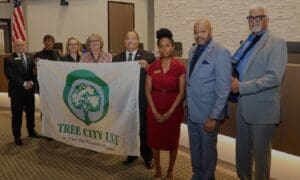An ethics complaint filed against Fayette County attorney Scott Bennett will be revised because it was based on the county’s former ethics ordinance and not its latest one.
Attorney Wayne Kendall, representing complainants Judith and Richard Moore, told the county’s ethics board Friday afternoon that he was unaware of the new ethics ordinance until the day before, so he would amend the complaint.
The original complaint accuses Bennett of soliciting Peachtree City attorney Richard P. Lindsey to file a lawsuit that resulted in adoption of a new five-district map for county commission seats in May, which Bennett has previously denied. The complaint also alleges Bennett approved the payment of attorneys fees to Lindsey stemming from that lawsuit totaling $3,850; Bennett said he was required to do so by a court order that he could not disobey.
On Oct. 11, Bennett told the county commission that he was confident he had conducted himself appropriately and he looked forward to getting the matter resolved by the ethics board.
At Friday’s ethics board meeting, several people including Fayetteville City Councilman Ed Johnson questioned the propriety of Brooks Mayor Dan Langford being appointed to the ethics board.
The concern is that Langford in his elected capacity having done “business with the county” might not be impartial, Johnson said.
Langford said he didn’t think his position as Brooks mayor would affect his decision in the case or constitute a conflict of interest.
Langford himself also pointed to the county’s ethics ordinance which requires that private citizens be appointed to the ethics board. Langford said he was concerned that, as an elected official in Brooks, could he also be technically considered to be a private citizen under the ordinance.
Langford said while he was familiar with the county commissioners, he is not familiar with county staff members, and in particular that he didn’t even know who Scott Bennett was prior to being notified of the ethics complaint.
County Administrator Jack Krakeel explained that the county commission selected volunteer appointees who were solicited from each individual commissioner. That process does not involve the seeking of applications and a public announcement of open positions.
Langford, who is also the chief financial officer for Landmark Christian School, said he did not mind leaving his fate on the matter up to his fellow ethics board members.
By county rules, the ethics board consists of three members and two alternates. In addition to Langford, the other two full-fledged ethics board members are attorney Sheila Huddleston and Peachtree City resident Scott Rowland. The two alternates are Pota Coston, a former criminal investigator for the Internal Revenue Service and Larris Marks, a retired human resources director for the U.S. Army Forces Command.
The ethics board plans to meet Wednesday, Nov. 28 to make its determination on the complaint. The board will be empowered to take one of six options:
• No admonishment and no further action;
• A public reprimand and admonishment not to violate the ethics code in the future;
• A formal reprimand;
• Public censure;
• Recommendation for termination, resignation or recall; or
• Recommendation for prosecution in the State Court of Fayette County.
The board can also decide to “admonish, formally reprimand, publicly censure” any complaining party who files a petition determined to be “unjustified, frivolous, patently unfounded or factually insufficient.”











Leave a Comment
You must be logged in to post a comment.